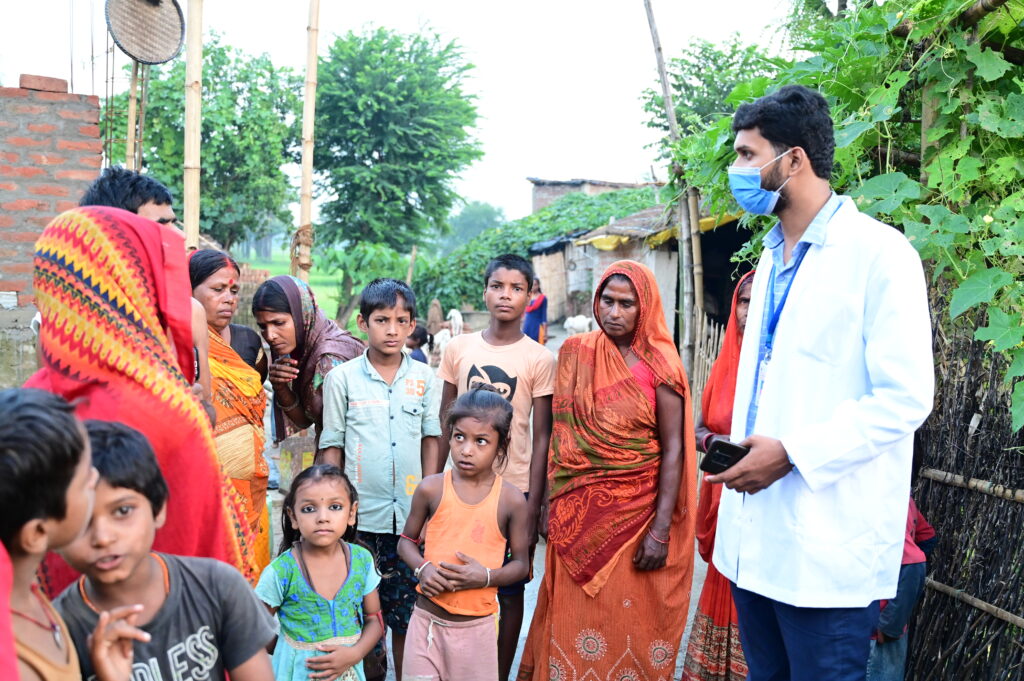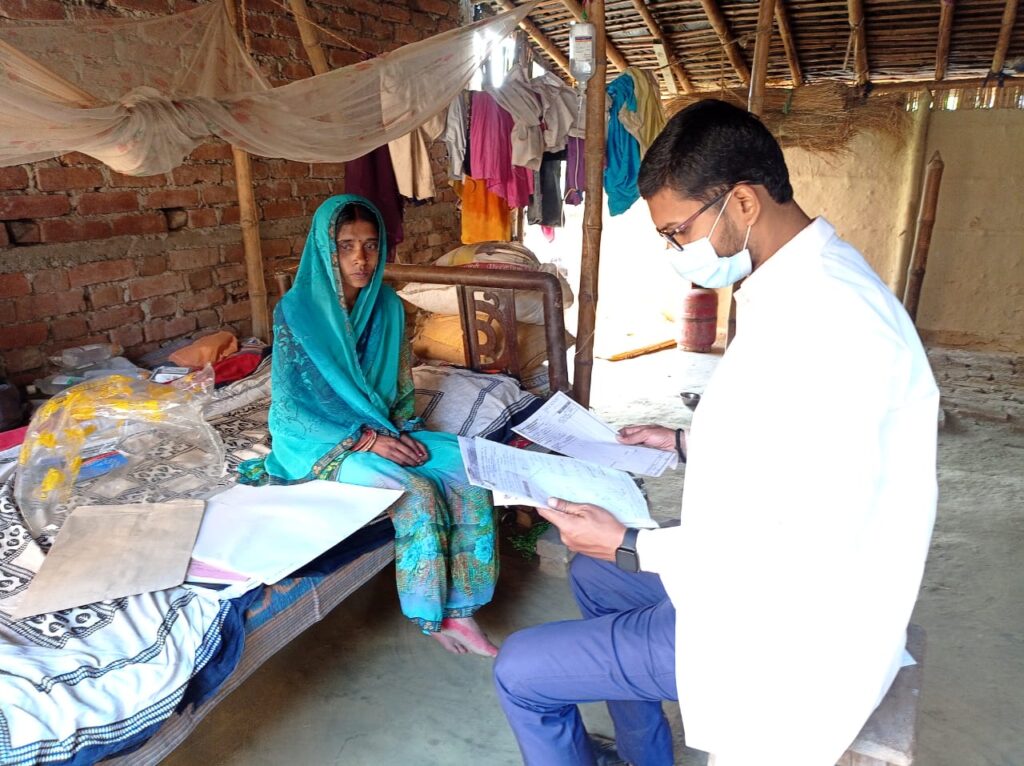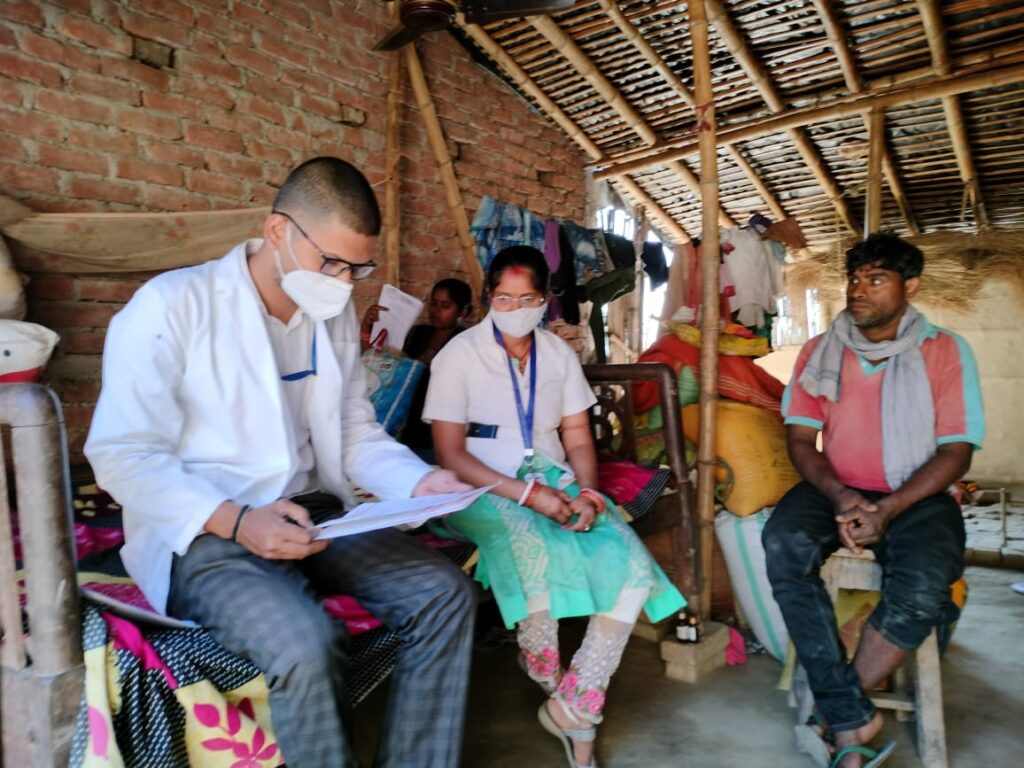With a passion for connecting with the community to improve their health, community health officer (CHO) Pranav Kumar divides his workday in two. He spends the first half of his day providing comprehensive primary health care services at the Lagma Health and Wellness Center (HWC) in Sitamarhi District, Bihar, managing services and overseeing his team. The second half of his day is dedicated to reaching out and educating rural communities about tuberculosis (TB). He has a purpose-driven vision.

“As a health professional, I visualize TB-free villages to contribute towards a TB-free India,” says the 28-year-old nurse and CHO.
Pranav knows how serious the task before him is: According to the World Health Organization, India has the highest burden of TB, accounting for around 27% of total TB cases worldwide. But he also knows that these deaths are preventable with proper care and treatment.
Making door-to-door visits with his team helps him detect active or suspected cases, while community dialogues help villagers recognize TB symptoms and initiate timely actions by family and community. Through their outreach, Pranav and his team can address stigma and discrimination against TB clients, a factor that often prevents people from seeking care despite recognizing symptoms. At the HWC, they provide counseling to a client and their family, discuss nutritional and hygiene care, disburse TB drugs, provide medication follow-up, facilitate access to existing government assistance if needed and support home-based sputum collection and home delivery of TB medicines.
As a new CHO in June 2021, Pranav quickly recognized that one of his focus areas needed to be TB, a disease that has an insidious onset and kills two people every three minutes in his country. Since then, his strategy has successfully helped detect and facilitate the treatment of 12 TB cases in the community he serves. He and his HWC team—17 ASHA workers (as community health workers are called in India) and an auxiliary nurse-midwife—ensured proper treatment and follow-up for those who required higher-level health facilities, resulting in all of his patients having successfully recovered.

“It is not enough to just create awareness,” says Pranav, adding, “It is a multi-pronged approach, which includes one-to-one dialogue with the families of patients on their nutritional and hygienic care and consistency in medicines that creates a supportive home environment for patients to fully recover.”
Pranav recalls becoming the first Nikshay Mitra of Sitamarhi District. Nikshay Mitra is an initiative of the Government of India under which benefactors (termed Nikshay Mitra) are encouraged to support TB patients and provide them with any required additional support, including nutrition. As a Nikshay Mitra, Pranav “adopted” Sheela Singh, a TB client, and provided her with nutritional support for nine months in 2022. He recalls clearly that Sheela needed that support because of her family’s resource crunch, which compromised her health. Sheela’s full recovery prompted him to subsequently “adopt” a 20-year-old youth.
Sheela and her family are grateful for Pranav’s support. “I would have lost my wife and my family would have crumbled down, had HWC team not helped us,” said Satyendra Singh, Sheela’s husband.
Pranav acknowledges that Jhpiego has played a vital role in building his capacity not just as a health provider but also in highlighting the need for CHOs like him, who are the first point of contact between the community and the health system, to deliver care compassionately.
In Bihar, integrating TB services at HWCs is one of the key components of the state government’s intervention called “Strengthening Roll-out of Health and Wellness Centers in Bihar.” With support from the Bill & Melinda Gates Foundation, Jhpiego is providing technical assistance across all 38 districts of the state as part of this initiative. So far, more than 3,100 CHOs have been trained to integrate TB services at HWCs. Jhpiego has also oriented 60 providers to use the government-run Nikshay portal and provided state-level orientations on programmatic management of TB preventive treatment to more than 550 providers.

CHO Pranav and his team attend to 20–40 clients at the HWC each day. Dedicated health care professionals like him, and the government’s priority “TB Free India” initiative, have resulted in more cases being detected and being brought into treatment across the country—from 131.5 cases detected per 100,000 population in 2020 to 172 detected per 100,000 population in 2022. Integrating TB services at HWCs is a strategic step in this direction.
As he sets out for yet another day in the community, Pranav is determined and hopeful that his approach to prioritize outreach services can effectively connect communities with essential health care services. “Every life saved from TB positively impacts the entire family,” said Pranav, who attributes his outlook to Jhpiego’s grassroots training approach. “I am committed to my community. My goal is to provide accessible health services, including TB detection and treatment close to home, ensuring everyone stays healthy.”
The following program team from Jhpiego’s Patna, Bihar, office provided technical review of this article: Dr. Narottam Pradham, Program Director; Dr. Pallavi Sinha, State Team Leader; Zeeshan Asif, State Program Manager; Raja Ram Pandey, Senior Program Officer; and Rupali Raina, Senior Program Officer.
Hena Naqvi is a Senior Documentation Officer in Jhpiego’s Bihar, India Office. Raja Ram Pandey, Senior Program Officer in the Bihar office, also contributed to this story.
Photos courtesy of CHO Pranav and Sanower John Lal, Senior Program Officer, Bihar office.



